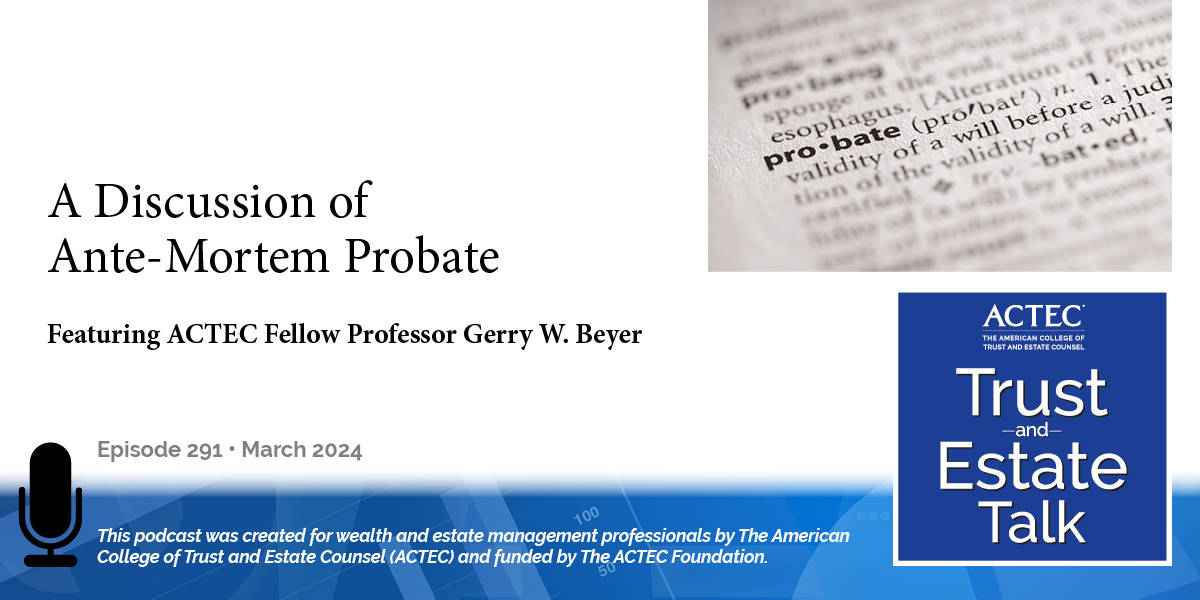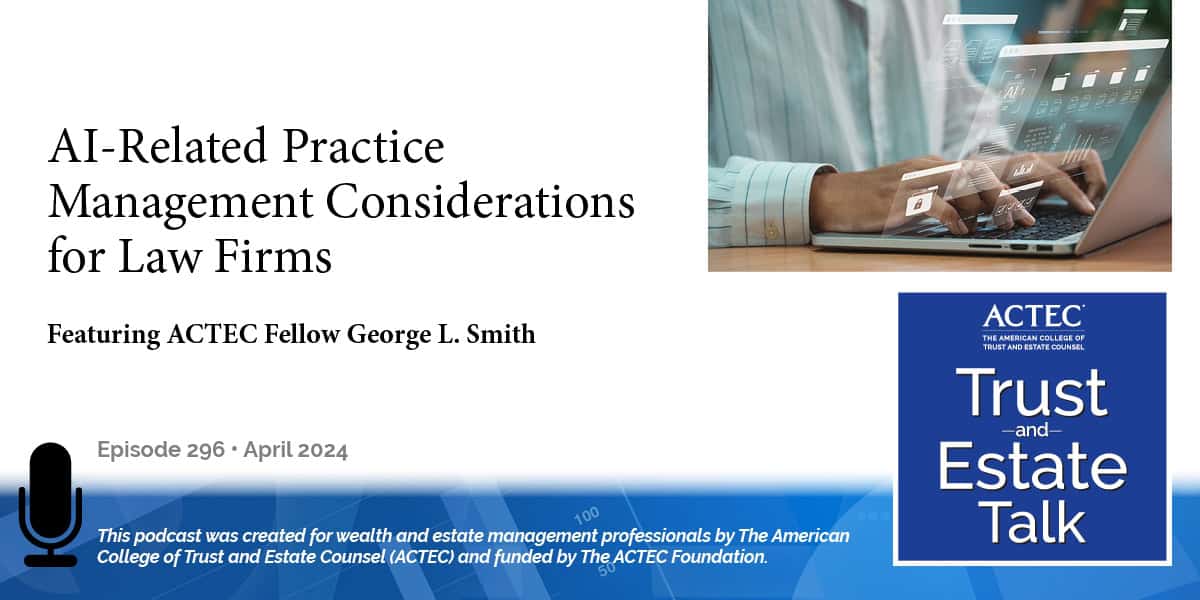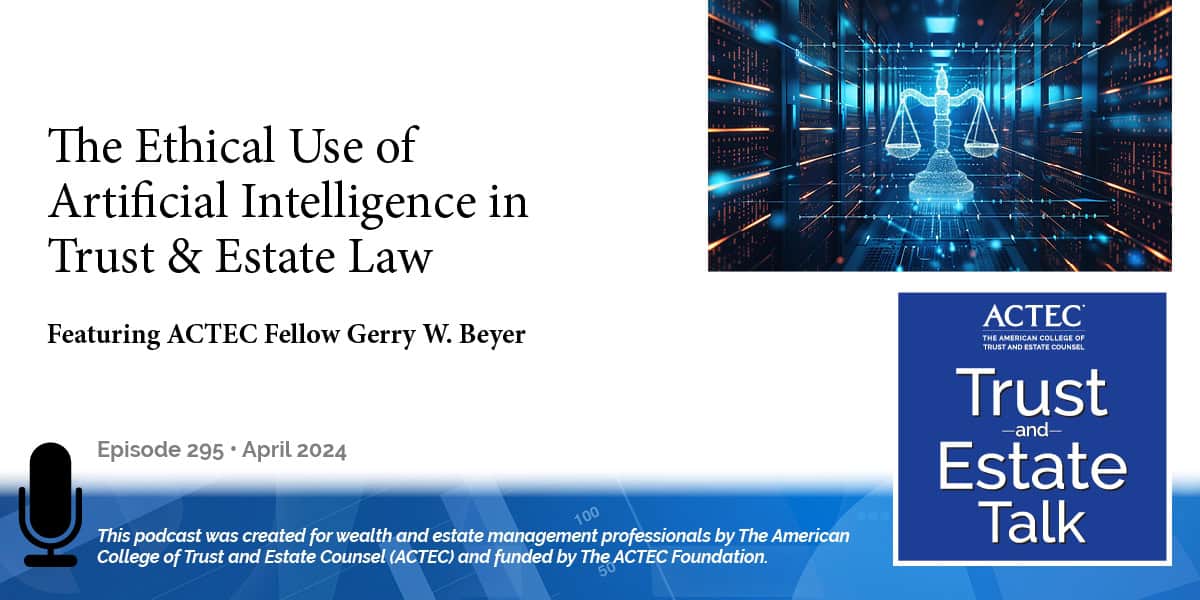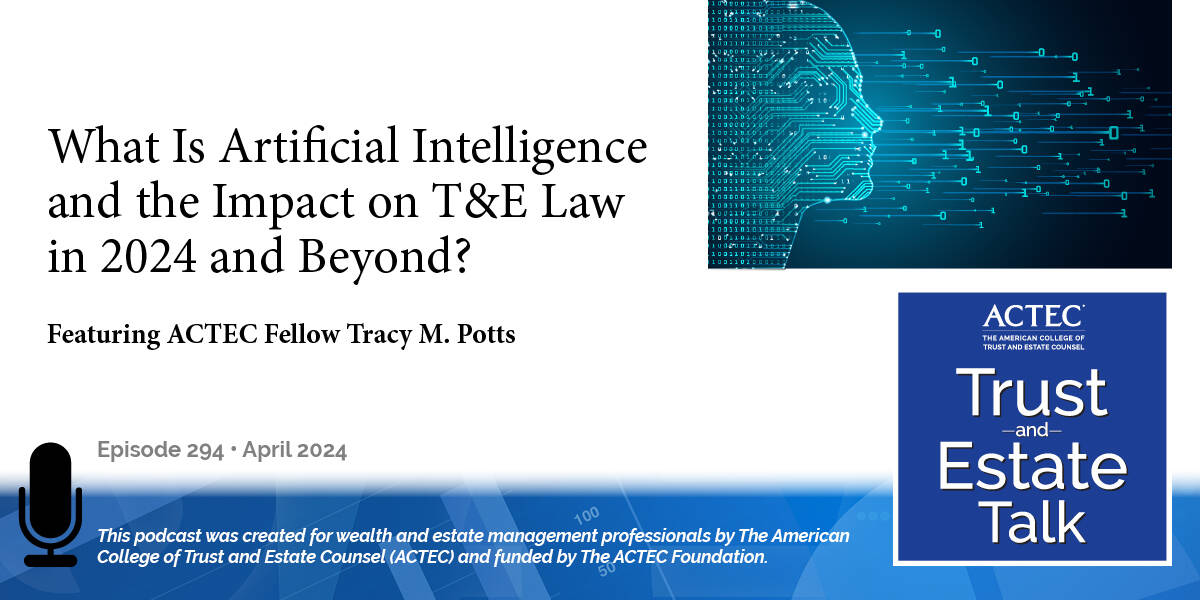A Discussion of Ante-Mortem Probate

“A Discussion of Ante-Mortem Probate,” that’s the subject of today’s ACTEC Trust and Estate Talk.
Transcript/Show Notes
This is Connie Eyster, ACTEC Fellow from Boulder, Colorado. We’re delighted to welcome ACTEC Fellow Professor Gerry Beyer of Texas Tech University School of Law in Lubbock, Texas to discuss ante-mortem probate, which is the process of validating the will of a living person. Professor Beyer has spoken on this topic as part of the ACTEC Trust and Estate Talk in 2020. We’re pleased to have him speak to us again to provide an update. Welcome, Professor Beyer. To start us off, maybe you could share a short explanation of what is ante-mortem probate.
Professor Beyer: Sure thing, Connie. Well, you said it quite accurately. Ante-mortem probate- or pre-mortem probate as it is sometimes called- is the proving of the testator’s will to be a valid will while the testator is still alive.
States That Allow Ante-Mortem Probate
Connie Eyster: And are there a few states that allow probate of a will of a living person?
Professor Beyer: At the moment, there are nine states that allow it. Back in the day, North Dakota in 1977, Ohio in 1978, and Arkansas in 1979 authorized the technique. Then there was a hiatus of maybe 30 years before another state adopted the procedure. That was Alaska in 2010, followed by New Hampshire in 2014, Delaware in 2015, and North Carolina in 2015. And there are also two other states that, not via specific ante-mortem statutes, do allow ante-mortem probate, and that would be Nevada and South Dakota.
Connie Eyster: Given that there are only a few states that have this kind of process in place, what are the circumstances that a testator might want to use it?
Professor Beyer: Well, there are some very good reasons why a testator would want to use this procedure. And the main one is the absolute certainty that a will contest cannot succeed because once you go through the procedure, the will is declared valid. And the time to appeal that judgment has run, the will cannot be challenged. So it’s an absolute foolproof technique to be sure a will isn’t challenged. The court has the ability to directly examine the testator for capacity, for lack of undue influence, can examine the document for validity, and you end up with a “locked-in” will.
Ante-Mortem Probate Risks
Connie Eyster: It sounds like a pretty good deal. What are the risks of doing an ante-mortem probate procedure?
Professor Beyer: Well, Connie, there are indeed some risks. First of all, it’s disruptive to the family because you have to reveal the contents of the will to everybody and if you’re cutting somebody out or putting a lot of restrictions on someone’s gift, that could make for some very awkward family gatherings. Then, of course, it could be embarrassing if the court actually finds the testator lacks capacity and there is a cost and a hassle associated with it. And then, if you want to make changes to the will and you want the benefit from ante-mortem probate, you’d have to go through the whole procedure over again.
Ante-Mortem Probate Procedure
Connie Eyster: Assuming the testator is interested in ante-mortem probate, what are the methods that states use for that process?
Professor Beyer: Both the lengthy statutes that states have, as well as the very basic statutes in Nevada and South Dakota, are based on the declaratory judgment model. So typically, heirs and beneficiaries are given notice and they can test if they so desire. If they don’t show up, the court will declare the will valid. If they contest, then the validity of the will will be litigated. The states have, though, many differences with regard to the procedures that need to be followed, so, if you’re going to use the procedure, you definitely want to research the exact steps that are appropriate for your state.
Connie Eyster: Why do you think more states haven’t adopted ante-mortem probate procedures?
Professor Beyer: The main reason I’ve heard is there is no Uniform Act and it’s not in the Uniform Probate Code. But what people don’t realize is that ante-mortem probate was supposed to be in the original Uniform Probate Code. But when the drafters were working on ante-mortem probate, they broke into two camps as to what type of model to use. There was disagreement. One group wanted to use the model that we currently use, which is a declaratory judgment contest model. Another group set forth a proposal to have an ex-parte procedure and administrative model. And they couldn’t decide which way to go forward, so to prevent the stoppage of the process of the uniform probate code, they simply decided not to include it at all. And so that’s been one of the obstacles, no uniform provisions. And then I’ve heard from some people that there’s a fear of malpractice claims by family members who defend a contest successfully and then say that the lawyer should have used the pre-mortem probate procedure and then they wouldn’t have had to endure the time and expense of a contest.
Connie Eyster: I’m not sure if you know the answer to this question, but I’m curious, if you do the ante-mortem procedure in one state and then the decedent dies in another state that doesn’t have that procedure. Would the ante-mortem probate procedure be recognized as valid in the state where the decedent passed away?
Professor Beyer: Connie, I don’t know of any direct case that has addressed that issue, but I would think the answer would be “yes” because virtually all states have a saving statute, which says that if the will is valid in the state in which it was written, it will be deemed valid in our state. Well, these wills would be deemed valid in the home state and so I think they would be given validity in other states as well.
Connie Eyster: Is there anything else you’d like to tell us about the ante-mortem probate procedure?
Professor Beyer: Well, some of the states that we talked about have expanded the technique so it can be used to validate other instruments. Many of the states allow inner vivos trusts to be validated similarly, and some even as far as powers of appointment and financial powers of attorneys. And I’m thinking that maybe in extreme cases, you might actually advise a client to change the state of domicile so the client can use this procedure. That’s really not as extreme as you would think. Clients do move to different states for different reasons. They move to states with no income tax, or with no estate tax, and so forth. So, you could see a client wanting to move to guarantee that the will can’t be contested, meaning that certain people are excluded, for example.
Connie Eyster: Well, thank you, Professor Beyer, for sharing your wisdom with us today. We so appreciate your time and expertise.
Professor Beyer: Great to be here, Connie. Thank you for having me.
Also may also be interested in:
- Ante-Mortem Probate as the Ultimate Will Contest Prevention Technique (Sep 2020)
- Professor Beyer’s article: Ante-Mortem Probate: A Viable Alternative
Latest ACTEC Trust and Estate Talk Podcasts

AI-Related Practice Management Considerations for Law Firms
A discussion for law firms about how to incorporate AI in their practice management, including staff considerations, the “billable hour,” and more.

The Ethical Use of Artificial Intelligence in Trust & Estate Law
A law professor offers insights into the risks, rewards, duties and ethical considerations of lawyers using AI in their T&E practices.

What Is Artificial Intelligence and the Impact on T&E Law in 2024 and Beyond?
A primer on the types and uses of AI, then a deeper dive into the impact on trust and estate law from types to applications to ethical considerations.

